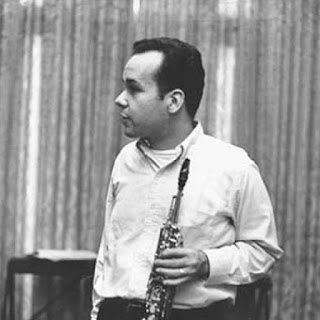In 1954, while still a student at the Manhattan School of Music, Steve Lacy was performing regularly with a Dixieland repertory band called the Dick Sutton Sextet on both soprano and clarinet. The band wasn’t Dixieland in the strictest sense. At times, they sounded more hard bop and West Coast than Dixieland.
Lacy recorded two albums with Sutton, the young trumpeter. The first was August 8, 1954, on an album titled Jazz Idiom, and the second was November 24, 1954, on an album titled Progressive Dixieland.
During this period, the Sidney Bechet influence on the 20-year-old Lacy is very evident from his use of the fast and wide vibrato that defined Bechet; his penchant for arpeggiated lines that outlined the chord structure, versus the chromaticism pervasive in the bebop vocabularies; and of course, how he maintains very close ties to the blues when playing the melody and while improvising. He often exclaims that he picked up the clarinet after hearing Bechet’s version of Duke Ellington’s “The Mooche, recorded in 1941.
Before we hear Lacy with Dick Sutton's group, let's first listen to the recording that inspired him to take up the clarinet, showing his entree into jazz. In this version of "The Mooche" recorded on October 14, 1941, we hear Bechet on clarinet, Henry Goodwin on trumpet, Vic Dickerson on trombone, Don Donaldson on piano, Ernest Williamson on bass, and Manzie Johnson on drums.
On this recording, Bechet does not take an improvised solo. He makes his musical statement solely from how he plays the melody. One of the paramount lessons Lacy probably learned from Bechet was the importance of being able to tell a story with one's sound--something Lacy seemed to have learned well. With regards to Bechet's sound, Lacy had this to say:
“Many did not care for his sound owing to his excessive use of a very wide vibrato. My own feeling is that this was a means, perhaps, of covering the natural inaccuracy of any given note on the horn itself."
And this is another tip I imagined Lacy learned from Bechet, when striving to achieve pitch ascendancy over the defiant horn.
After Lacy took up the clarinet in 1949 at the age of 15, he began hanging out at the Stuyvesant Casino, a music venue located at 140 Second Ave., at Ninth Street, that primarily featured Dixieland bands. In this picture, we see a young 19-year-old alongside many of mentors at the time, such as clarinetist Pee Wee Russell (far right), saxophonist and clarinetist Cecil Scott, who taught Lacy clarinet and the soprano saxophone when he 16 years old, (left of Pee Wee Russell) and trumpeter Harry Hot Lips Page (left of Cecil Scott). This was pre-Monk and Cecil Taylor, mind you.
In 1951, Lacy played his first gig at the Stuyvesant Casino as the featured performer. The club billed it as “Bechet of the Today.” Something he certainly felt embarrassed about.
 |
| Stuyvesant Casino (bandstand) |
 |
| Stuyvesant Casino at 140 Second Ave., at Ninth Street, New York City |
The following tracks are from the two aforementioned Dick Sutton Sextet albums recorded on Jaguar Records in 1954. What’s really remarkable is that even though Lacy had only been playing the soprano for four years, he already has a personal sound (though influenced by Bechet), excellent sound control, and a good amount of technical fluency. It’s as though he was meant to play the instrument.
Track 1: "Softly, as in a Morning Sunrise" was recorded on the album titled Jazz Idiom in 1954 on Jaguar Records.
Performers:
Dick Sutton - trumpet
Ray Anderson - trombone
Steve Lacy - clarinet, soprano sax
Don Sitterlex - baritone sax
Mark Trail - bass
Billy DeHay - drums
Track 2: "Let's Get Away from it All" was recorded on an album titled Progressive Dixieland in 1954 on Jaguar Records.
Performers:
Performers:
Dick Sutton - trumpet
John Welch - trombone
Steve Lacy - soprano sax
Frank Caputo baritone sax
Mark Trail - bass
Billy DeHay - drums
Track 3: "Avalon" was recorded on the album titled Jazz Idiom in 1954 on Jaguar Records.
Performers:
Dick Sutton - trumpet
Ray Anderson - trombone
Steve Lacy - soprano sax
Don Sitterlex - baritone sax
Mark Trail - bass
Billy DeHay - drums






No comments:
Post a Comment